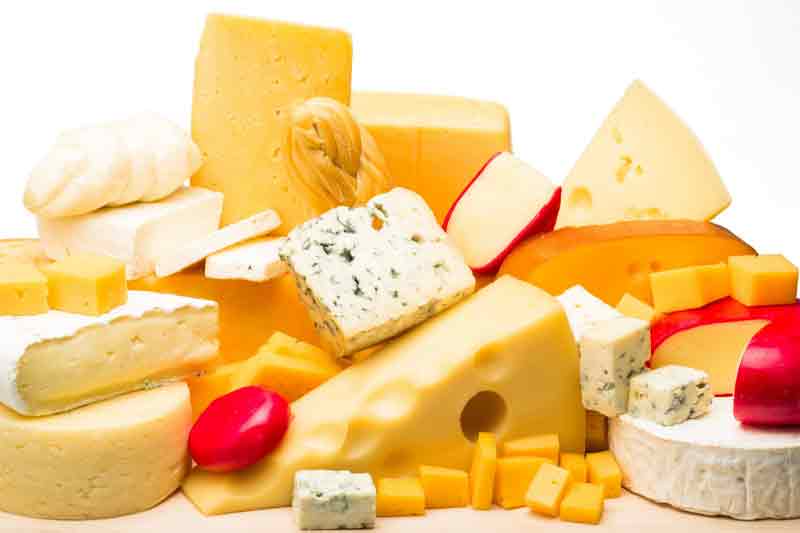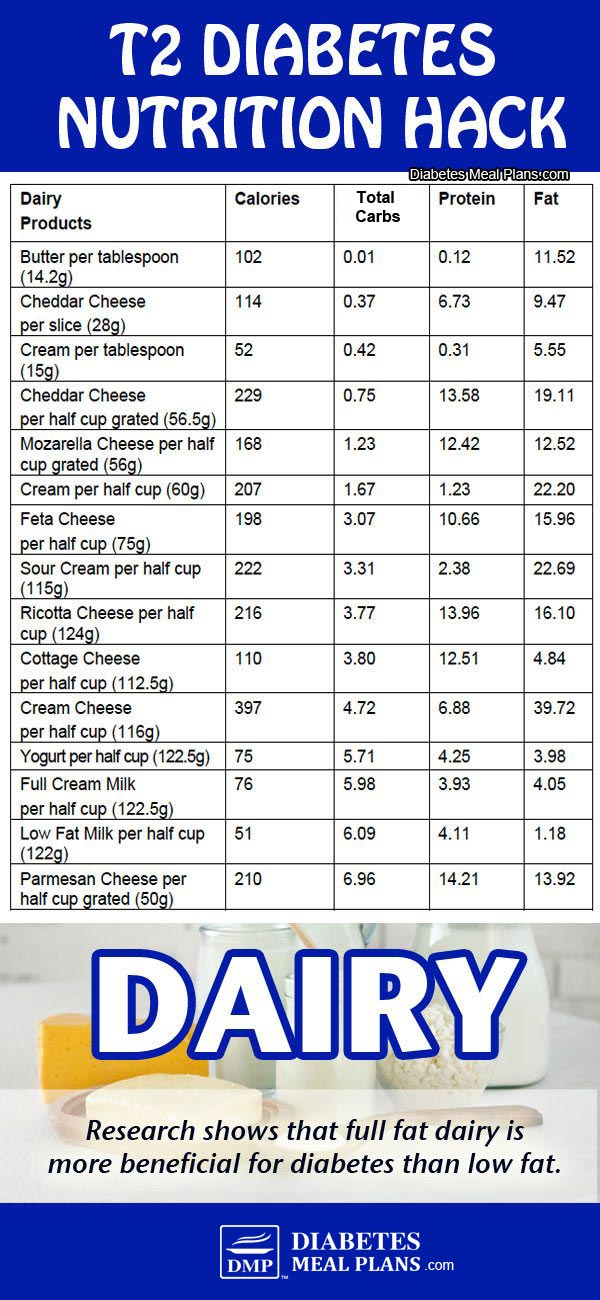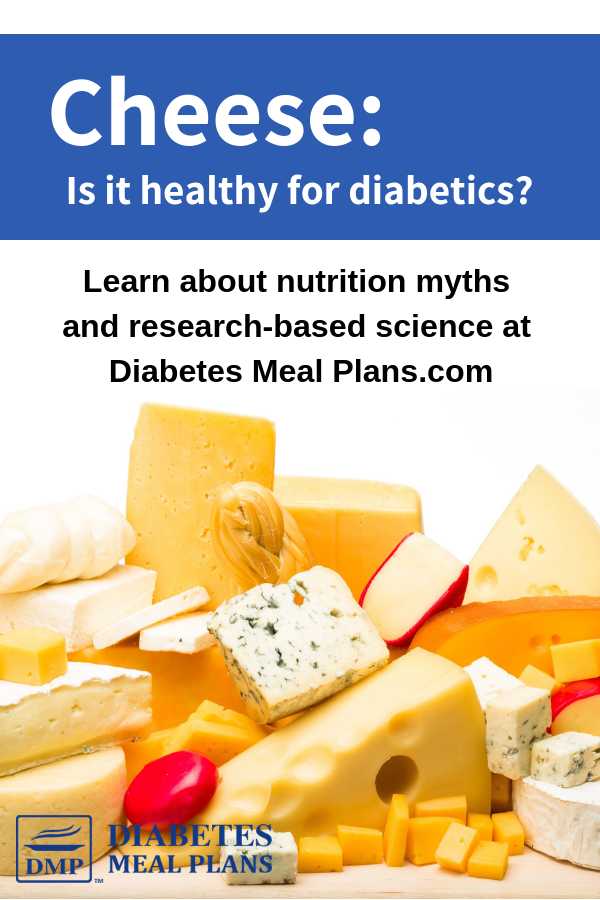There’s nothing quite like a creamy, tasty piece of cheese for a snack. Or adding shredded cheese to melt over the top of a meal.
But what about cheese for diabetes and prediabetes, is it okay to eat?
Great question. And truth be told, there is quite a bit of controversy about good ‘ol cheese. After all, cheese may be high in protein, but what about all the fat? Will it clog your arteries, lead to high cholesterol and cause a heart attack?
These are valid questions that deserve real answers!
So let’s get to it, starting with some basic nutrition facts about cheese.

Cheese Nutrition Facts
One slice of cheddar cheese (1 oz/ 28 g) contains 113 calories, 6.4 grams of protein, 9 grams of fat and close to zero carbohydrates (0.8 grams).
The main macronutrients in cheese are fat and protein. In terms of fat, cheese contains a mixture of both saturated and unsaturated fats – 6 grams saturated and 3 grams unsaturated.
While all that saturated fat may sound scary, you do not need to fear it!
Despite commonly held assumptions, saturated fats do not cause heart disease. In fact, there is no solid scientific link between saturated fat intake and heart disease (we’ll explain this more in the research section, so keep reading!).
Cheese is a nutrient dense food that provides several valuable micronutrients (per slice):
- Calcium – 199 mg
- Phosphorus – 127 mg
- Vitamin A – 348 IU
- Vitamin D – 7 IU
The other good news about cheese is that it’s very low in carbohydrates, especially cheddar and mozzarella cheese, which contain virtually zero carbs (less than 1 gram).
While some cheeses are a little higher in carbs, such as ricotta (3.7 grams per half cup) and feta (3 grams per half cup), these are still considered a low carb food that can be enjoyed as part of your diabetic diet.
Dairy Products Compared
Unlike other dairy products such as yogurt or plain cow’s milk, cheese is very low in carbohydrates because it is low in the naturally occurring sugar called lactose.
This chart shows the differences in carbs between several different dairy products.

Feta cheese and cottage cheese have slightly more carbs per serving than mozzarella and cheddar do, but not enough to be concerned about in terms of influencing blood sugar levels too much.
But where you need to be a little more careful is with milk and yogurt, keeping a tighter check on these when monitoring your carb intake. And while Parmesan is awesomely flavorful, it contains the most amount of carbs per quantity.
All and all though, dairy products are relatively low in carbs compared to many other foods choices you have, so in general you can feel free to include them in your diet.
Does Eating Fat Make You Fat?
The Myth:
Eating higher amounts of fat in your diet will cause you to pack on the pounds, but a low fat diet will help you slim out.
The Truth:
The low-fat diet trend and the mindset that accompanied it still linger on today, but the truth of the matter is, eating more dietary fat doesn’t instantly make you gain weight!
Certainly eating too much of anything can make you fat. But in truth, carbohydrates are a key driver of fat storage, not fat.
Your body needs dietary fat to support cellular growth and produce energy, along with aiding important fat soluble vitamins and hormones to do their job.
And when it comes to diabetes, excess carbs are a much greater threat to your health than fats are. In fact, the same is true for the average healthy person because when fat is cut out of the diet, carbs are often increased and this can prevent weight loss, and may even lead to weight gain.
Not to mention, the intake of sugar/carbs have a greater link to the development of diabetes, cancer, heart disease and other health conditions. This is due to the inflammation that excess carbs cause in the body.

Research on Cheese and Diabetes
Along with the notion that eating fat leads to weight gain, there has been a long-standing assumption that saturated fat intake leads to cardiovascular disease. Since people with type 2 diabetes and prediabetes are already at higher risk for heart disease, it is important that you know the facts.
When we look at scientific research, the fact is, this age-old claim about saturated fat and cardiovascular disease doesn’t hold up as strongly as it once did.
In recent years, researchers have reviewed clinical trials comprising almost 60,000 participants, only to determine a very weak correlation between saturated fat intake and heart disease risk.
Other researchers examining observational data have found zero connection between the two factors. These observational findings have been supported by several researchers.
For example, a 2010 cohort study that followed 347,747 subjects for several decades reported that there was no significant evidence linking saturated fat intake to cardiovascular disease risk.
A more recent study of over 35,000 participants concluded that a person’s risk of ischemic heart disease was not affected by their intake of saturated fats from dairy products.
A 2015 study found that the 26,930 participants who ate high-fat dairy products had a significantly lower risk for developing type 2 diabetes than the participants eating low-fat alternatives. With the greatest reduction of risk seen in those who consumed full fat cheese, cream and fermented milk.
So at this stage, there is no evidence to suggest that cheese is bad for your health in any way. And if anything, it may improve your health. This is not at all surprising since people have relied on dairy as a valuable food source for centuries.
Fasting Blood Sugar Tip
If you struggle with higher blood sugar levels in the morning, watch the video below for an interesting tip proven by research, that involves cheddar cheese.
Be sure to subscribe to our YouTube channel for more helpful videos.
Conclusion
If your question is: “is cheese a healthy choice for diabetes or prediabetes?”
The answer is yes.
Cheese is a natural, nutrient dense food source that is high in protein, low in carbs and provides the body with valuable micronutrients.
While we wouldn’t encourage you to live on cheese alone, because there are plenty of other healthy food sources to consume as part of a balanced diet, especially non starchy vegetables, cheese is certainly a food you can enjoy on a regular basis. ;)
Please pin, share or tweet this info to help others – thanks!

ELIZABETH KOSTADINOVA
i have been diagnosed with diabetes what cheese should and can buy at supermarket
Dr Jedha
All types of cheese are fine to eat Elizabeth. Refer to the info in the article again too.
Sabato Bonavita
Any help to those of us that are burdened with both diabetes and ckd.appreciate your comments. Thank you
Emily - Dietitian (MS, RD)
We have a few kidney disease specific resources such as this food list and this article. You may find it beneficial to work with a Registered Dietitian for even more support, as both CKD and Diabetes require a very specific diet.
Mary
Thank you for this article. I am pre diabetes and try to watch the carbs and sugar. The doctor has prescribed Metformin but I am trying to do this with changes to my diet.
My question is, what about Brie? Goat cheese? Still good?
Emily - Dietitian (MS, RD)
All of those cheeses are fine, they are still no carb!
bonnie borgeson
Ok ladies, I’m going to try the vinegar and cheese at night for the next several nights. I range morning numbers 120’s and oh my goodness I had chop suey for two days with brown rice and the morning was 140…..scared me to death. I’m a newbe with this 1 year. So I will try. Have you ever heard of insatiable sweet appitet at night time late. It’s like I doze for a few minutes and I NEED sweets. Not at all during the day but like an addict at late night hours past 11 and 12. Horrible body sweats, around the butt area and lower back and top of legs. Is this something dangerous? Thank you girls, you have been more helpful then my GP Dr. that could careless what I say. Hugs to you.
Emily - Dietitian (MS, RD)
Hi Bonnie. You should ask your doctor about what you’re experiencing at night because they will know more about your current medications and past medical history.
Without knowing the full story, you could possibly be becoming hypoglycemic some nights (craving sugar, sweating are both symptoms), but there are probably other explanations for what your experiencing as well. Do you ever feel shaky as well? If so, that would further support the possibility that you may actually be having low blood sugar. Again, please check with your doctor for further confirmation.
Julie Blaskie
Hi!
Thank you for this information! By following your tips and common sense, I am keeping my blood sugar down – especially the advice on eating cheese, avocados, nuts, and eggs! I also enjoy my veggies and fruits while I keep in mind more protein and less carbs. I find a small snack of cheese before bed keeps my morning numbers lower – as well as a good night’s sleep. (I have help here with Celestial Seasonings Sleepytime herbal teas, especially echinacea and sinus soother when allergies or other things going around.)
The information you provide through this website certainly makes eating healthier easier with the choices provided. I feel more enabled and in control now. I have shared this website with friends who have relatives struggling and hope it will help them. The attitude of focusing on what we can enjoy is better than lamenting the things we can’t have if we can’t do things in moderation. Thank you for helping me to have a more positive mindset!
Emily - Dietitian (MS, RD)
We LOVE hearing such positive success stories! Thank you for sharing, Julie. Please let us know if you ever have any questions along your journey to your best health.